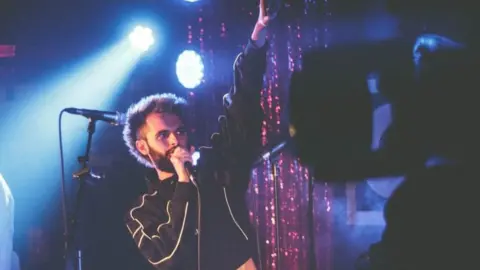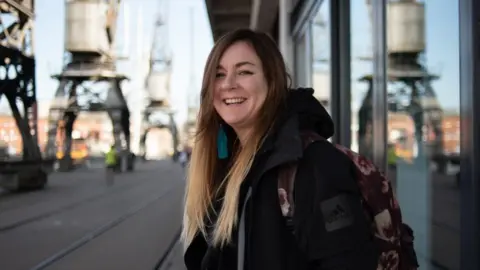Drink spiking: What's being done to stop it?
 Isabel Davies
Isabel DaviesKeys, ID, bank card, phone... got them and you're ready for a night out. But what about wearing a drink-testing wristband?
That's the sort of thing some people say you should have with you at pubs and clubs.
Spiking incidents aren't common. Millions of people go out every week, and the number of spiking cases reported is a tiny fraction of that.
But the increased number of people reporting cases has put the issue front and centre.
As politicians, police, students and those in hospitality continue to discuss solutions to tackle drink and needle spiking, Radio 1 Newsbeat has been speaking to people about the changes they're making.
The musician: Make fans comfortable
It's not just police or venues that have a duty to protect people, but musicians too - that's the opinion of Dundee-based rapper MC Salum.
At a recent gig, the hip-hop artist, whose real name is Mikey Colville, paid for everyone in the crowd to have wristbands which can detect if your drink has been spiked.
You put a drop of your drink on to the wristband, and if it's been spiked with ketamine or GHB - two common drink spiking drugs - it will change colour.
Mikey spent over £100 on the wristbands and didn't make a profit from the show but says he thinks they're important "to make people feel safe".
"They're a natural deterrent. If you're planning on doing something malicious, you'll see the bands and think again."
 Diana Georgieva
Diana GeorgievaAs a result, he says the gig was "one of the most beautiful shows" he's ever played.
"A big part of that was that everyone felt comfortable and you could feel it in the room."
When it comes to choosing venues for future gigs, Mikey plans to challenge them on what their safety protocols are before agreeing to perform there.
"I want to show people that a positive change can happen and it's about men, and venues, putting in work."
The student: Clubs have responded to outcry
Since late October some people have been boycotting nightclubs and bars across the country, as part of the Girls Night In protests.
The groups are associated with universities and aim to highlight the problem of drink spiking as well as women's safety in general.
Second-year student Isabel Davies co-founded the Leeds branch of the campaign and claims the boycott has succeeded because local clubs have listened to their concerns.
"They've responded to the loss of economic revenue," the geography and economics student says.
She's encouraged clubs to train security and bar staff to spot the signs of spiking.
"We're also talking about clubs having volunteers on hand to give healthcare and offer support - like charging your phone and helping people find friends," she says.
 Izzy Broadhurst/Isabel Davies/Joscelin Story
Izzy Broadhurst/Isabel Davies/Joscelin StoryThe group has also spoken to West Yorkshire Police about helping clubs to fund bar staff training and buy things like drink protectors.
Isabel says she's not ruling out further boycotts but stresses she wants to get to a point where she can put on "a Girls Night Out - to show people we are safe".
The city planner: Believe the victims
For Bristol City Council the emphasis has been on "cracking down on perpetrators" by advising venues on the best evidence to collect.
Carly Heath, who works as the council's Night-time Economy Adviser, tells Newsbeat a common problem is venues not knowing what to do if someone is spiked.
Her team has made a toolkit to help venues out, as well as distributing loads of testing kits.
"Part of the guide says believe the person who's been spiked, make sure their welfare is taken care of and know what evidence the police need," she says.
"We know that there's a short window within which to get tested, because drugs leave the body within 12 hours, so we're trying to re-educate on what needs to happen to make a prosecution."
 Carly Heath
Carly HeathThe police: Carry testing kits like condoms
Although drink spiking has made national headlines recently, Sergeant Dave Moore has been working on prevention methods for years.
He works for Devon and Cornwall Police, which leads on tackling drink spiking across the country.
He says he'd like to see individuals carry drink testing kits with them on nights out.
"It just makes you more of a harder target," he says.
"It could be one of those things people take to clubs or house parties, very much like having condoms."
The industry: Vigilant security
This week, MPs debated whether or not bag searches at nightclubs should be made law after a petition calling for it to be mandatory reached over 100,000 signatures.
The petition was set up by 24-year-old Hannah Thomson, who started it after seeing a report on social media about a woman being injected with a needle in Edinburgh and then seeing stories elsewhere.
Although it's not currently law, many clubs do searches already.
The organisation representing night-time venues says clubs are doing extra searching as one of many ways to step up action against the "alarming" rise in reports of spiking.
Michael Kill, CEO of the Night Time Industries Association, says: "We're putting barriers in places, enhancing CCTV, enhancing security, enhancing searching, and we're being more vigilant, particularly in training staff."


